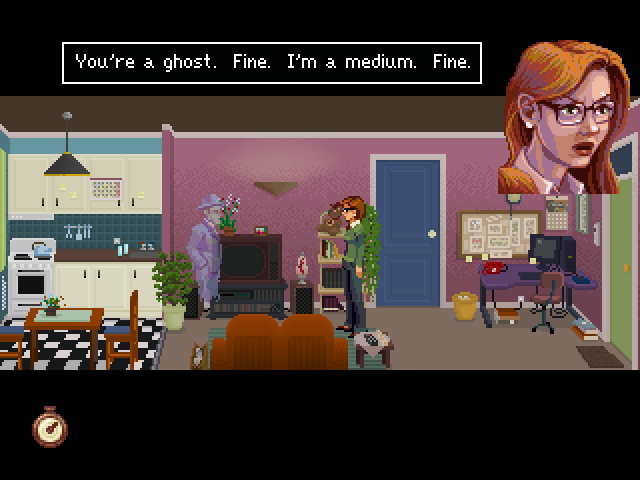
The Blackwell Legacy
Written by: Rik
Date posted: September 22, 2018
- Genre: Adventure
- Developed by: Wadjet Eye Games
- Published by: Wadjet Eye Games
- Year released: 2006
- Our score: 7
Wadjet Eye’s The Shivah took a concept that could potentially have been awful in the wrong hands (a crime-solving rabbi – great!) and delivered it in a way that revealed real craft and talent. A surprisingly smart, well-written and accessible caper, its understated charms drew me back into the adventure game fold after a considerable period spent in the wilderness. I would say it didn’t take long for me to progress onto Blackwell, Wadjet Eye’s major series to date, except, well, it’s [checks date] three years since I wrote about The Shivah here, so obviously it did. We’re here now, that’s the main thing. [Is it? – a reader]
Just as the setup for The Shivah could have produced something dreadful, the basics of Blackwell – a writer, with a sarcastic ghostly sidekick that only she can see, talking to other ghosts and solving mysteries – also sound equally unpromising. But, just as The Shivah turned out okay – more than okay in fact – so too does Blackwell, turning what could be a corny concept into something plausible.
The Blackwell Legacy is the first of five games in the series, of varying lengths but all fairly short, initially released in 2006 but subject to some revisions and adjustments in 2011 (it’s the updated version we’re dealing with here). You are Rosangela Blackwell, New York resident, and struggling writer. We join Rosa as she reflects on the loss of her only living relative, her Aunt Lauren, who passed away following a lengthy stint in psychiatric care. Rosa doesn’t know how or what to feel under the circumstances, but unbeknownst to her, her Aunt’s death has more significant consequences than she first realised.
Those consequences come in the form of Joey Mallone, a ghostly companion to Rosa’s Aunt, and with Lauren’s death, he becomes Rosa’s problem. (“I’m the Blackwell Legacy, darling!”) Aside from the general weirdness and annoyance of suddenly having a ghost in her life, there’s work to be done: it turns out that Rosa is now a medium, someone who can not only see Joey but other ghosts too. These are lost souls, who don’t realise they’re dead, haunting somewhere significant to them when they were alive. It’s Rosa’s job, with Joey’s help, to help convince them of the truth and help them move on.
That’s probably about as much as I want to say at this point (and it’s possibly too much, if you really don’t want to know anything), but that’s how Blackwell works: there are ghosts in each game, you play detective to find out what happened in their life, and then use that information to help them accept the truth and – quite literally – head towards the light.
For this first game, you control Rosa only, with Joey very much a mere sidekick, following you around, offering helpful (or unhelpful) advice at various points. The interface is pretty basic: you can look at (right click) or interact with (left click) items in the game world or in your inventory. Inventory items will be fairly rare, and there’s little need to combine them with each other or with in-game characters or objects. This is mainly a dialogue-based game: you collect clues in your notebook and then ask characters about those subjects when you talk to them. Sometimes you need to combine clues in your notebook for Rosa to make the connection that they’re related, which some people may find disingenuous, but I personally prefer it to the time-honoured staple of using objects on other objects repeatedly.
There’s not much else to say about the mechanics, so it’s worth moving onto where Blackwell really shines: the writing. In Legacy, it’s not so much in the main case you have to solve — although here too there is real skill in the way the game manages to deal with quite serious topics like teen suicide, somehow maintaining a light-hearted tone without trivialising the subject – but more the little touches that establish Rosa as a character. To relate to the player that a character is socially awkward requires subtle handling if it’s to be convincing and successful, but Legacy pulls it off.
Although there’s lots of lengthy exposition about her background early on, it’s in the everyday interactions that we get a sense of who Rosa is. The awkwardness of small talk is bang on, from not knowing how to react to a neighbour’s friendliness, to a forthright response to being patronised by a doctor: I quickly felt able to understand, and warm to, Rosa. (And incidentally, the doctor is also well-written: he’s a knob in an annoying, understated way, rather than an all-out obvious dickhead). Credit to Rebecca Whittaker, who voices Rosa throughout the series (another actor, Sande Chen, was on voice duties for the 2006 version but once Whittaker came onboard and replaced her for the later games, Wadjet Eye elected to have her re-record Rosa’s lines for Legacy). A nod to the graphics here, too: despite their rudimentary fundamentals, they communicate Rosa’s body language very well – you get to know her character not only from what she says but how she moves and interacts with the world.
Joey, I’m not quite as sure about: I don’t know if it’s the 1920-isms – a “sweetheart” here, a “dollface” there – or his whole sarcastic shtick, or the fact that, in this game at least, his voice and mannerisms seem very similar to Rabbi Russell Stone from The Shivah (it’s the same actor, but still), but there’s something that bothers me about him that I can’t quite put my finger on. Still, he and Rosa certainly make a good double act, even if their relationship isn’t, for obvious reasons, that well developed yet.
A couple more things worth noting about the audio-visual side of things: first, I am an unapologetic fan of the blocky low-res approach. I know that when pixel art is done in quite a stylised, faux-retro way, it might be a little irksome to some, but that’s not the case here. (I understand it started out as a budgetary necessity and then the results proved to be so successful Wadjet Eye felt no need to change – quite right too). We’ve already noted the character work on Rosa, but some of the background artwork, often based on real New York locations, is really very well done. Secondly, there’s some catchy music on offer: I’d say possibly there are times when it doesn’t seem particularly appropriate for what’s happening on screen, but there’s some good stuff here (I really like the little techno tune that plays while you’re in the College dorm, in particular).
Legacy isn’t the strongest Blackwell game: at times it’s structured in a way that seems a bit odd, there are some moments where you get stuck for slightly silly reasons, there’s a lot of setting up, and I’m not all that sure about the ending. Knowing what’s to come, though, I’m perhaps inclined to err on the generous side when evaluating its merits. Even though this isn’t an episodic series, the games are frequently to be found bundled together, and I am (spoiler alert) going to recommend that you play the rest of them, so I don’t think it makes much sense for me writing this now to judge it in isolation.
Even though Blackwell gets better from here, this is still well worth playing. It’s short and not overly challenging (which some may see as a negative), so a single playthrough followed by a second go trying to nab the fun little achievements while listening to the developer’s commentary (both traditions happily continued from The Shivah) make for a fun and undemanding few hours. And I’d be surprised if you didn’t want to progress to the other games in the series afterwards.

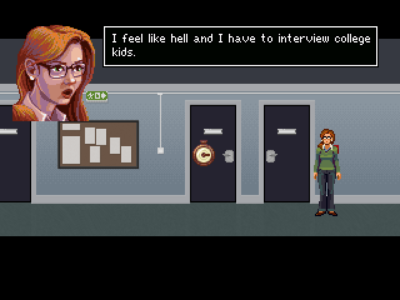
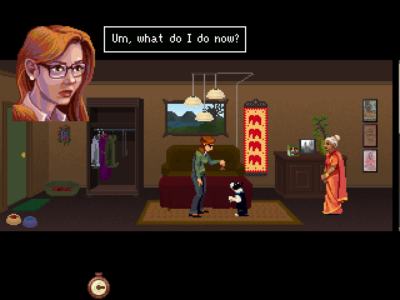
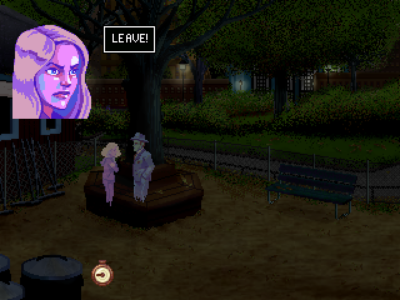
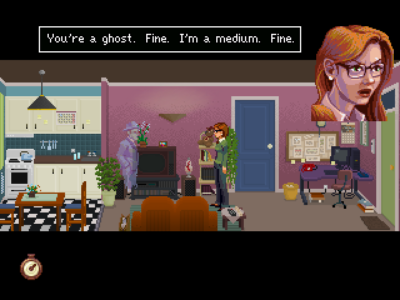

 Posts
Posts
Interesting point of view. Personally, I found this game *much* too wordy.
October 5, 2018 @ 8:37 pm